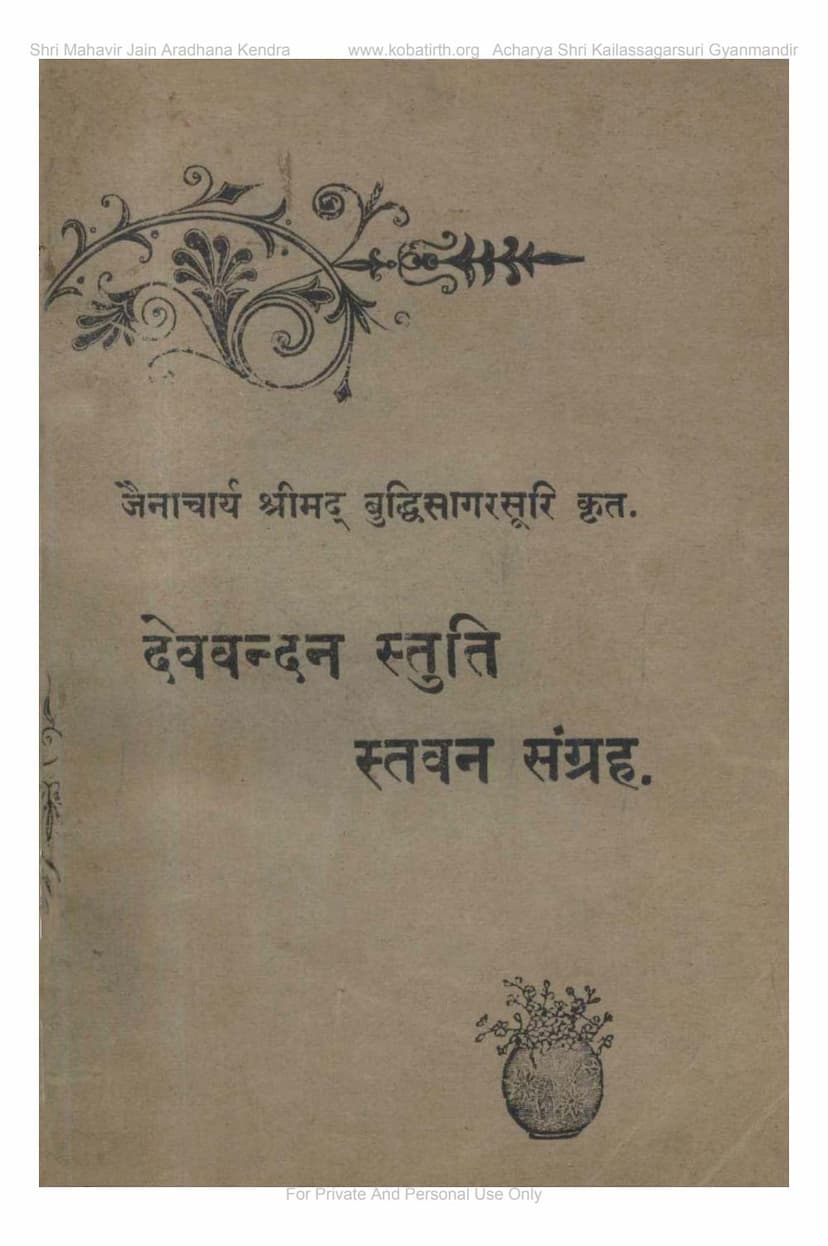Dev Vandana Stuti Stavan Sangrah
Added to library: September 1, 2025

Summary
Here's a comprehensive summary of the Jain text "Dev Vandana Stuti Stavan Sangrah" by Buddhisagar, based on the provided pages:
Book Title: Dev Vandana Stuti Stavan Sangrah (Collection of Devotional Prayers, Praises, and Chants) Author: Acharya Shri Buddhisagar Suri Publisher: Shri Adhyatma Gyan Prasarak Mandal Catalog Link: https://jainqq.org/explore/008557/1
Overall Purpose and Content:
This book is a collection of devotional hymns, prayers (Vandana), praises (Stuti), and chants (Stavan) composed by the revered Jain Acharya Shri Buddhisagar Suri. The primary purpose of the text is to facilitate the spiritual practice and devotion of Jain followers. It emphasizes the importance of connecting with the divine principles embodied by the Tirthankaras, particularly Lord Mahavir. The collection aims to provide a variety of devotional expressions that cater to different tastes and spiritual inclinations, fostering a deeper connection with the self and the teachings of Jainism.
Key Themes and Arguments Presented (as per the introductory and explanatory sections):
- Diversity of Devotional Expression: Acharya Buddhisagar acknowledges that individuals have diverse spiritual tastes and preferences. Therefore, this collection includes a variety of stotras, stutis, and stavans, ranging from those focused on specific Tirthankaras and holy sites to those emphasizing different philosophical or emotional aspects of devotion. The author argues that it is natural for individuals to gravitate towards the devotional forms that resonate with them, and this freedom of choice in spiritual expression should be respected.
- The Need for Contemporary Devotional Literature: The introduction addresses a potential question about why new devotional compositions are needed when ancient ones exist. The response is that while ancient works are valuable, contemporary spiritual needs and understanding may call for new expressions. The author emphasizes that these new compositions are born from personal experience and spiritual inspiration, aiming to serve the spiritual needs of the current generation.
- The Nature of True Devotion: True devotion is described as stemming from the heart and reflecting the spiritual state of the composer. The hymns are not just mere words but are intended to evoke devotional emotions, purify the soul, and lead to self-realization. The text distinguishes between genuine devotion aimed at spiritual purification and liberation (Moksha) and superficial devotion driven by the desire for worldly gains or external validation.
- Importance of Understanding and Emotion: The book stresses the significance of understanding the meaning of the devotional verses rather than reciting them mechanically like a parrot. Devotion should be accompanied by genuine emotion and an understanding of the spiritual message conveyed. Chants and hymns that inspire spiritual awakening and emotional upliftment are considered most effective.
- Language and Accessibility: The collection favors compositions in the vernacular language (likely Gujarati, given the publication details) because it allows for easier understanding and immediate connection with the devotional sentiment. This accessibility is crucial for fostering a deeper emotional and spiritual engagement among the devotees.
- Philosophical Underpinnings: The text touches upon Jain philosophical concepts such as the reliance on various schools of thought (Dravyanuyoga), the importance of internal transformation over external rituals, and the understanding of spiritual progress through different stages of life (childhood, youth, and wisdom). It highlights the idea that different forms of devotion appeal to individuals in different spiritual states.
- Spiritual Practice and Goals: The ultimate goal of engaging with these devotional texts is presented as spiritual purification, the enhancement of spiritual qualities (like knowledge, perception, and conduct), and ultimately, the attainment of liberation (Moksha). The text encourages devotees to use these compositions to strengthen their faith, love for the divine, and to experience spiritual bliss.
Specific Content Highlights:
- Chowmashi Dev Vandana: The book includes specific rituals and prayers for the Chaturmas (four-month monsoon period), a significant time for spiritual practice in Jainism.
- Chaitry Vandan and Stutis: A substantial portion of the book consists of "Chaitry Vandana" (prayers for temples) and "Stutis" (praises) dedicated to various Tirthankaras. The content is organized, listing specific Tirthankaras and their associated prayers.
- Praise of Holy Sites: The collection includes stotras dedicated to significant Jain pilgrimage sites like Siddhachal, Girnar, Abu, Ashtapad, and Sammetsikhara, highlighting their spiritual importance.
- The Twenty-Four Tirthankaras: A significant portion of the book is dedicated to the individual Tirthankaras, with each likely having a dedicated Vandana, Stuti, and Stavan. The index clearly lists these, from Rishabhanatha to Mahavir Swami, and even includes specific "Kalash" (concluding verses or summaries).
- Thematic Stavans: Besides individual Tirthankara praises, there are stavans dedicated to specific occasions or principles, such as "Navapad Oli" (nine foundational principles), "Ambila Tap" (a specific fast), and various other thematic verses.
- Mahaavir Swami's Prominence: Lord Mahavir is frequently mentioned and honored, reflecting his importance as the last Tirthankara and the spiritual guide for the current era.
- Guidance on Devotional Practice: The text offers guidance on how to approach devotional practices, emphasizing sincerity, understanding, and the ultimate goal of spiritual purification.
- Inclusion of Other Works: The latter pages list other books published by the same Mandal, providing a glimpse into their broader publication efforts in spiritual and religious literature.
Overall Contribution:
"Dev Vandana Stuti Stavan Sangrah" by Acharya Buddhisagar serves as a valuable resource for Jain devotees seeking to deepen their spiritual connection through devotional practices. It offers a rich collection of hymns that blend philosophical insights with emotional expression, encouraging a path of self-purification and spiritual growth in alignment with Jain principles. The work reflects the author's deep spiritual realization and his commitment to making spiritual teachings accessible and relevant to the community.